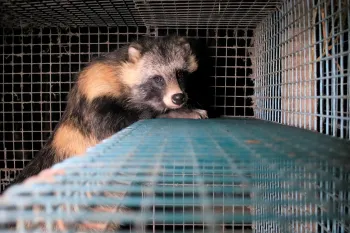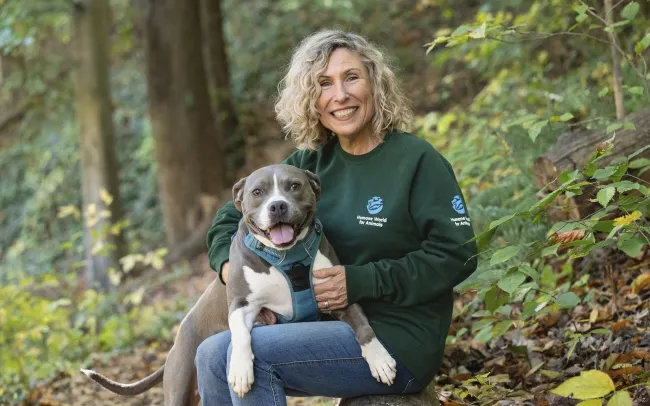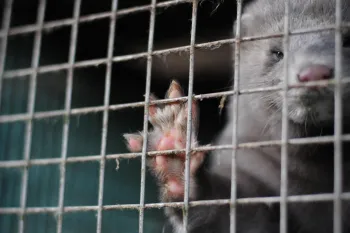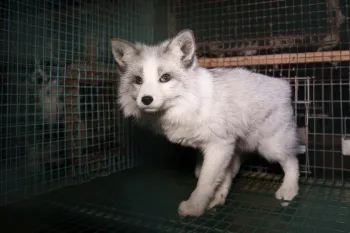We believe that everyone can make decisions each day that help to create a more humane world. And so, it is in this spirit that we are joining a global call to the international outerwear fashion brand Woolrich to finally end its complicity in the fur industry.
The animal fur used for Woolrich’s parkas comes from fur factory farms in Finland. On these “farms,” wild animals, such as foxes and raccoon dogs, spend their entire lives in small wire-bottom cages, deprived of any hope of engaging in their natural behaviors and following their instincts, such as digging and nesting. At the end of their lives, after they have grown large enough for their pelt to be deemed profitable, they are electrocuted before being skinned, and their fur turned into trims on coats. A recently published major scientific opinion has outlined the stark reality behind fur farming, finding that it fails to meet the basic welfare needs of the animals kept on such farms and concluding that suffering ‘cannot be prevented or substantially mitigated’ in the current caging systems used across the fur industry.
Woolrich also uses fur from coyotes trapped in the wild. When a wild animal gets caught in a leghold trap or snare, they may suffer in fear for days without food or water. Animals often gnaw off their own limbs in a desperate attempt to escape before the trappers return to kill them by either suffocation or bludgeoning.
It should be obvious that such treatment of animals is unacceptable. We are proud to be part of the Fur Free Alliance’s global campaign urging Woolrich to end its support of animal cruelty. The Fur Free Alliance coalition is made up of 50 animal protection organizations across more than 30 countries, making this Woolrich campaign one of the largest corporate anti-fur campaigns of all time. And yet, attempts to contact the brand, which has 34 stores and outlets throughout Europe and Asia, as well as its Luxemburg-based parent company, L-GAM, via email or phone for the last two years have gone unanswered.
Other outerwear companies, such as Canada Goose, Moncler, Patagonia and many others, have already adopted fur-free policies. The latest fashion brand to announce a fur-free policy was Italian luxury brand Max Mara in 2024, after supporters around the globe contacted the company through emails, phone calls and countless social media posts. The Fur Free Alliance has also worked with Gucci, Prada, Armani, Hugo Boss and many others to announce fur-free policies. Today, more than 1,600 brands and retailers have pledged to go fur-free by joining the Fur Free Retailer Program.
Woolrich touts that it preserves and protects nature, yet the company continues to support a fur trade that kills wildlife and causes environmental damage. Fur factory farms and tanneries are extremely harmful to the quality of soil and waterways—pumping waste and toxic chemicals into the surrounding environment. If the executives at Woolrich truly cared about nature, they would choose to protect wildlife and their environment rather than sowing destruction.
Brands that still sell cruel fur products have a shrinking supply chain and marketplace, as well. Dozens of countries, states and cities throughout the world have banned fur production or the sale of fur because of animal cruelty and risks to the environment and public health. Most recently, this past July, Switzerland became the latest to impose such a ban on fur.
I have no doubt that these major advances mean that the end of fur is near. Together, we can create a world where fashion reflects compassion.




